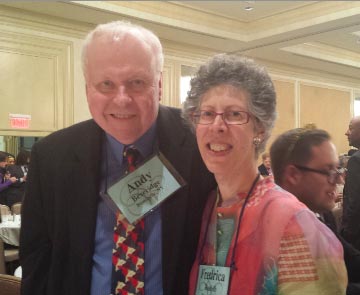Last year, I wrote about the frustration I felt living with “Mr. Right,” who did not share my attitude toward waste (“Taming a Wasteful Spouse”). From thermostat settings to water use, the differences seemed irreconcilable. My post drew comments from many readers who reported similar experiences with family members and roommates and shared their own coping strategies.
This month, my mysterious “Mr. Right” has come forward to respond to the original post.
Here’s what my husband said, followed by my response:
So What’s Wrong With My Wife’s Personal Crusade?
“First off, people who ‘Hate to Waste’ are not doing anything substantive for the environment. Their well-meaning, somewhat abstemious behaviors may actually cause a backlash and make it harder to reach out to the less committed.
My view is that working to effect change in policy is the only way that actual conservation will occur and global climate change can be slowed or reversed. Taking small steps like saving a few kilowatts at home will do little or nothing. But a real policy that could bring real change in energy use and global warming should be within our grasp.
Fredrica’s attempt to slightly shrink our carbon footprint by keeping our house too cool in the winter and too hot in the summer, turning off lights in empty rooms, not wasting paper, reducing, repairing and recycling rather than throwing things away, etc. is a doomed approach and may be counter-productive…
Waste Watchers Fail to Look at the Larger Picture
…What should be a campaign to change policies, give incentives for all to save energy and back those policies up with sanctions where necessary, has been turned into a moral imperative with no discernible effect, except in our household, my sweet wife can bask in a glow of moral superiority. It is a classic example of displacement of goals. Presumably, the goal is to help the environment, but instead of focusing on concrete steps that actually might successfully confront those issues, a lot of well-meaning people are following a series of rituals and small steps to “cut waste.” In short, noble intentions are transposed into a series of personal actions.
There is nothing wrong with trying to conserve, but such individual actions alone will never change our wasteful energy policy. Hectoring others engenders backlash and only politics and policies can save the environment.”
Here is My Response to “Mr. Right”:
“I agree that public policy to address environmental problems is imperative. But I would argue that we need both sound top-down environmental policy and individual actions at the grassroots level to reduce our carbon footprints. It’s similar to having a good public health system and adopting healthy personal habits. Why not do both?
And those behavioral changes that others in the WeHateToWaste community and I try to make are not just symbolic, or evidence of goal displacement, but are rooted in a worldview that favors sustainability over waste…
Small Steps Make Good Sense and DO Add Up
…To me, turning off the light when you leave a room is not a demonstration of “moral superiority,” but an application of sheer common sense and a bit of good old-fashioned frugality. Aside from the logic (why light an unoccupied room?) and economic benefit (why not save the money?), small actions like that can multiply and add up to lower demand for electric power, less reliance on fossil fuels like coal that are burned to run our appliances, and ultimately, fewer new power plants (including nuclear ones with their unique risks). Furthermore, bottom-up demand for more sustainable goods and services can help spur technological innovation and design improvements…
I am NOT a “Morally Superior” Waste Hater!
…The cost/benefit calculation seems clear to me—it’s a no-brainer. Why would anyone object to reducing waste? And I don’t engage in or expect heroic measures or sacrifices, just simple actions that are hopefully also easy and fun![]() , if not yet popular. I don’t consider myself morally superior for doing so. But I do derive intrinsic satisfaction and peace of mind from trying to do right by the planet and the people I share it with. And I also believe in the power of one (or two)…and the cumulative impact of many.”
, if not yet popular. I don’t consider myself morally superior for doing so. But I do derive intrinsic satisfaction and peace of mind from trying to do right by the planet and the people I share it with. And I also believe in the power of one (or two)…and the cumulative impact of many.”
Can My Marriage be Saved?
Which position — mine or “Mr. Right’s” — is closer to your own? Tell us below how you have dealt with a difference in approaches to addressing wastefulness with your spouse, other household members, friends or co-workers.
Posting Guideline – Opinions expressed are solely those of the contributors and WeHateToWaste implies no endorsement of the brands mentioned. Stories published on WeHateToWaste.com are intended to prompt productive conversations about practical solutions for preventing waste. Please post comments accordingly. All postings become the property of WeHateToWaste.com.






I think for a lot of people, myself included, small steps to reduce waste are not just about making a difference in the bigger picture. It’s about saving money, for example I refuse to pay a few dollars for a small bottle of water- I carry my reusable bottle wherever I go! And I will take every measure to get every drop from all my food items and beauty products, especially when I’m trying to support my self living in New York! But more importantly than money saving, living less wastefully is just a better and more efficient way to live, and gives much satisfaction.
I don’t think one person preventing waste in their life will have any large scale impact, but if everyone can see the sense it makes for personal benefits, and starts to take some small steps for themselves, them maybe we will see some impact on ‘the bigger picture’
Small steps are empowering to individuals and they can lead to larger steps. If we weren’t empowered by the small steps the big things wouldn’t happen. That’s what I believe!
Sorry, Andy. I’m on your wife’s side. If we wait for “politics and policies” to make things right, we’re all truly “doomed.” Perhaps a closer look at a news headline from this past week will verify my negativity: “US Environmental Protection Agency (EPA) Barred From Getting Advice From Independent Scientists.” How will this help make progress toward a sustainable future? As long as corporations and the oil industry have their hands in the pockets of politicians, individual actions are all we have to slow the giants from destroying the planet. If this means one by one we rebel and refuse to consume and cease to waste, then I’m calling all waste haters and the not-yet-converted to do it now!
Like many other things in life, it’s not an either or-both contribute toward the goal of waste reduction. Maybe one can’t be w/o the other…
Ben, I hear you loud and clear. I suspect it’s the small steps from the grassroots that starts the chain reaction leading to business change and policy, etc. etc. So no one should tell us they don’t matter — because eventually they and everyone else’s small steps do.
The small steps DO matter! For instance, someone who volunteers at the soup kitchen will help a few of the homeless people in the community, they won’t be able to feed everyone in the world who is hungry. But that is not going to stop them from volunteering at the soup kitchen because they know that they’re making a difference in some way.
To reduce, reuse, and recycle means making a choice to have a small impact with the greater picture in mind.
I personally am on Fredrica’s side with this one. Although small steps might not immediately make the big changes we hope to see on a large scale, those big changes will never be made if there aren’t individuals out there taking small steps toward those larger goals. I think that the power of influencing others should never be underestimated. As a key piece of the no-waste mindset, influencing others and passing on our small steps really has the potential to make a big change. I know I will continue to take these small steps and do my best to pass them onto to all those “Mr. Right’s” out there.
In the ideal world, our political leaders would take our long-term self interest for current and future generations and help us conserve resources and restore our natural capital. Unfortunately, devastating projects like the Keystone pipeline are even being considered. There has been enough stagnation on The Hill that I do not see our political leaders passing the legislation that IS necessary for societal changes.
Taking individual action is not going to be the whole solution. Individual consumers are not the major contributors to waste – rather the burden is on large businesses, large-scale agriculture, and other big entities. Despite this, the individual actions we are PUBLICLY making with our purchasing power – at the grocery store, clothing shops, and other – are forcing companies to remodel their business plans. As a small example, last night, I learned that organic baby food used to be 3% of the market, and now it is 25%. This demonstrates that markets do respond to new demands by the people.
In our country, we focus on the consumer culture. By banding together, teaching others, and setting new standards, we shift the power from businesses to the end users – US! We need to be educated consumers because we are the voice that businesses and politicians respond to. Once the bottom line suffers, CEOs reinvent or get replaced. So treat transactions like political votes & vote for the products that align with your values.
I believe this is one of the central and most important conversations taking place within the larger sustainability debate. Like, Fredrica said, the choice to reduce waste is simply a logical cost/benefit calculation and individuals should not be criticized for that decision. However, it is also true that until systemic structural change takes place, individual actions will only get us so far. Even the most environmentally minded individuals are constrained by larger structural flaws, but this does not mean that their actions are not meaningful. At the same time, it is certainly true that this type of systemic change requires both bottom-up and top-down action. Truly reducing waste means tackling our culture of consumption, which stems from individual lifestyle choices, cultural forces, and official policies. “Mr. Right” can judge waste-haters as morally superior, but unless he is drafting new policies and actively engaging with policy makers then he is all talk and no action. Issues as large as waste reduction necessitate actions of multiple magnitudes, but when there are 8-billion of us, small actions can add up while at the same time generating awareness.
I can’t even tell you how many times I’ve had this very same conversation. It’s a classic debate: can individuals really “make a difference” or will we all just be forced to change our wicked ways when the economy no longer encourages our wasteful habits?
The latter is perhaps the stronger force, but as multiple people have mentioned, giving up on the former can feel like giving up hope. A feeling of personal efficacy is extremely important when it comes to living conscientiously in a globalized world.
There may be some question about whether or not individual actions have ever driven systemic change, but one thing that has NEVER made a positive difference is extreme jadedness — except insofar as it might drive one to look for solutions beyond the status quo.
(That being said, sanctimony is never in order, as it does tend to irritate people more than inspire them. Luckily, personal financial incentives, as Beth suggested, handily sidestep moral issues altogether.)
Making meaningful changes in regards to the environment is not going to rely solely on one side of this argument or the other, you need both policy change and personal changes in order to make a difference. The beliefs of the few, can inspire the actions of the majority. For instance, as being environmentally conscious becomes more popular, more stores are offering organic or eco-friendly options. Being green is cool now and the more individuals who voice this opinion, the more the majority will follow lead. Although I agree that we do need policy change, I just think you need to start from the bottom, the individuals. Also, I personally feel that people who are wasteful yet claim to be environmentalists are somewhat hypocritical. If someone truly cares about environmental issues they should not just be blaming big business and the government, but should take personal responsibilities for their actions to lead a less wasteful lifestyle.
I recently read about a study conducted by an old UCLA professor of mine to understand what motivates people to conserve energy. She found that health concerns, not money, actually motivate people to cut back. I found this fascinating because so many environmental economists maintain this idea that the climate crisis can be solved by assigning a dollar amount to our carbon emissions and allowing the market to shift accordingly. The problem is that so many externalities such as asthma-related deaths and cancers, to name a few, are nearly impossible to pin a dollar amount to. And these health concerns, according to the study, are what really matter to us.
If we wait around for market shifts and policy reforms, we are neglecting the simple things we can do right now in our personal lives to improve our own qualities of life and personal health. Sustainability can’t be viewed in such an all-or-nothing vacuum: simple things like eating organic, shopping locally, walking more, taking a break from our screens on the weekends to enjoy some good old-fashioned time outdoors (biophilia is real!) – these are all things that improve our health and happiness, and are sustainable too.
For more about the study, you can read this article:
http://www.thestar.com/news/world/2015/01/12/health_environment_motivate_people_to_cut_energy_use_study_finds.html
This debate is certainly one that needs both sides in order to be successful. It is often grassroots and individual actions that lead to larger legislative actions. While policy changes can have a large impact, if everyone takes part in their own individual way, these actions can just as quickly add up and create a positive effect.
I once had a roommate that was extremely wasteful. She would leave the lights on in unoccupied rooms. She would buy a water bottle, drink half of it, forget about it, and then buy another one. She would buy a ton of groceries, only to eat out several nights a week, leaving her food to go bad. Having known her for several years prior to living with her, I was shocked by her behavior. I genuinely did not understand how a person could be so casually wasteful. There came a point, when I felt like I needed to have a conversation with her. I was dreading it! I went back and forth, wondering if her wasteful behavior really mattered in the grand scheme of things? Was it even worth having a conversation with her? After finally making up my mind, I decided to only tackle the light issue; I figured I was not in a place to reprimand her on buying water bottles or letting her food go bad. Through our conversation, I learned that she wasn’t even aware that she was leaving the lights on. It was only when I pointed it out (and strategically left all of the lights she turned on) that she became aware of behavior.
Following our conversation, I saw my roommate make an effort to shut off the lights when leaving a room. And several months after we moved back home, I got a phone call from her proudly announcing that she had been motivating her family to adopt her new behavior. Through this experience, I realized that in influencing the people around us, we have the power to influence a whole cohort of people. So, yes, I believe small steps can be helpful in reducing waste.
Thank you so much for this article! I’ve recently been examining my wasteful behaviors more closely and have encountered THE SAME opposition from my own Mr. Right. It’s great to know we’re not alone 🙂
I’ve found that some issues lend themselves to compromise more easily than others. When I brought up composting my husband was resistant, but later conceded that it would be okay as long as we found a system that didn’t attract snakes and other critters.
He was actually the one that wanted to buy a Nest, and although his motivation was to save money rather than the planet, it helps us reduce our energy use. When I suggested finding alternatives to toilet paper, I was politely told that it would never happen EVER.
“I would argue that we need both sound top-down environmental policy and individual actions at the grassroots level to reduce our carbon footprints” – This is spot on. Just because the top-down approach is still taking off doesn’t mean that individuals shouldn’t embrace their own responsibilities now. Great read!
While small steps to conserve may seem insignificant on a small scale, once we zoom out and look at our behaviors as a collective, we can see that small efforts do add up. As a cashier in a grocery store, I heard this a lot: “Oh, I forgot my grocery totes in the car. I’ll just have plastic this one time.” or “Give me paper. I use them for recycling.” When I was new and my coworkers complained about this common excuse, I thought they were acting a tad judgmental. But after only a month of ringing people up in the third busiest Trader Joe’s in the country and seeing at least thirty people come through my line per hour, I began to realize the volume of waste I was facilitating.
I think Dr. Seuss had the right idea with this one: “Unless someone like you cares a whole awful lot, nothing is going to get better. It’s not.” Although individuals making small changes may not solve all of our environmental problems, individuals banding together to encourage others to make the same changes can be hugely effective. Grassroots movements have been enacting change across the world for decades, and their action often causes progress at legislative levels.
I learned about this debate in College. It is hard to change people’s attitudes about thinking about wasteful habits when it effects them in the future, also known as the “grandchildren effect”. Why would I do something today that won’t effect be tomorrow by might effect generations down the road. Thoughts?
Haris – You’re right that “long term” thinking (preferably to the 7th Generation) is key to sustainability–for government, companies and consumers alike. But the debate I have with Mr. Right is more about taking personal actions (small steps) vs. waiting for changes in government policy that are needed to slow or reverse climate change.
I got into an argument with my dad because he thought I was being too moralistic for urging him to buy a water filter (instead Poland Springs). Eventually, he caved, but I learned a great lesson about how to be persuasive: I can’t annoy someone into agreeing with me.
I think a big problem with American consumer habits is that wastefulness is in many ways incentivized. Consumers are expected to buy the cheapest product possible and companies, in an attempt to appease this demand, create cheaply made products that are designed to break in enough time to retain the consumer’s trust in the product (and buy it again) but not too much time where potential profits are lost.
Confronting wastefulness on an individual level is something we can all do better at and aims at confronting the very forces that pressure us to buy cheaply made products en masse. If people start thinking of their dollar as a vote cast, we may not be as willing to support products that violate human rights, the environment and ourselves.